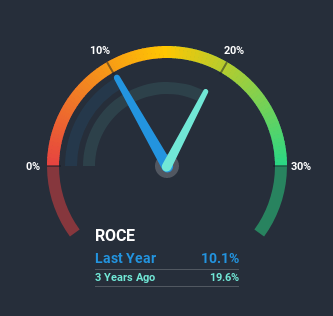Here's What To Make Of Booking Holdings' (NASDAQ:BKNG) Returns On Capital
Did you know there are some financial metrics that can provide clues of a potential multi-bagger? Typically, we'll want to notice a trend of growing return on capital employed (ROCE) and alongside that, an expanding base of capital employed. Put simply, these types of businesses are compounding machines, meaning they are continually reinvesting their earnings at ever-higher rates of return. Having said that, from a first glance at Booking Holdings (NASDAQ:BKNG) we aren't jumping out of our chairs at how returns are trending, but let's have a deeper look.
Return On Capital Employed (ROCE): What is it?
If you haven't worked with ROCE before, it measures the 'return' (pre-tax profit) a company generates from capital employed in its business. Analysts use this formula to calculate it for Booking Holdings:
Return on Capital Employed = Earnings Before Interest and Tax (EBIT) ÷ (Total Assets - Current Liabilities)
0.10 = US$1.8b ÷ (US$22b - US$4.0b) (Based on the trailing twelve months to September 2020).
Therefore, Booking Holdings has an ROCE of 10%. In absolute terms, that's a pretty normal return, and it's somewhat close to the Online Retail industry average of 9.3%.
See our latest analysis for Booking Holdings
In the above chart we have measured Booking Holdings' prior ROCE against its prior performance, but the future is arguably more important. If you'd like, you can check out the forecasts from the analysts covering Booking Holdings here for free.
What Can We Tell From Booking Holdings' ROCE Trend?
On the surface, the trend of ROCE at Booking Holdings doesn't inspire confidence. Around five years ago the returns on capital were 21%, but since then they've fallen to 10%. And considering revenue has dropped while employing more capital, we'd be cautious. This could mean that the business is losing its competitive advantage or market share, because while more money is being put into ventures, it's actually producing a lower return - "less bang for their buck" per se.
The Key Takeaway
We're a bit apprehensive about Booking Holdings because despite more capital being deployed in the business, returns on that capital and sales have both fallen. Yet despite these concerning fundamentals, the stock has performed strongly with a 62% return over the last five years, so investors appear very optimistic. In any case, the current underlying trends don't bode well for long term performance so unless they reverse, we'd start looking elsewhere.
Booking Holdings does have some risks, we noticed 3 warning signs (and 1 which is a bit unpleasant) we think you should know about.
While Booking Holdings isn't earning the highest return, check out this free list of companies that are earning high returns on equity with solid balance sheets.
This article by Simply Wall St is general in nature. It does not constitute a recommendation to buy or sell any stock, and does not take account of your objectives, or your financial situation. We aim to bring you long-term focused analysis driven by fundamental data. Note that our analysis may not factor in the latest price-sensitive company announcements or qualitative material. Simply Wall St has no position in any stocks mentioned.
Have feedback on this article? Concerned about the content? Get in touch with us directly. Alternatively, email editorial-team@simplywallst.com.

